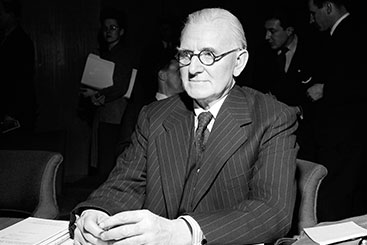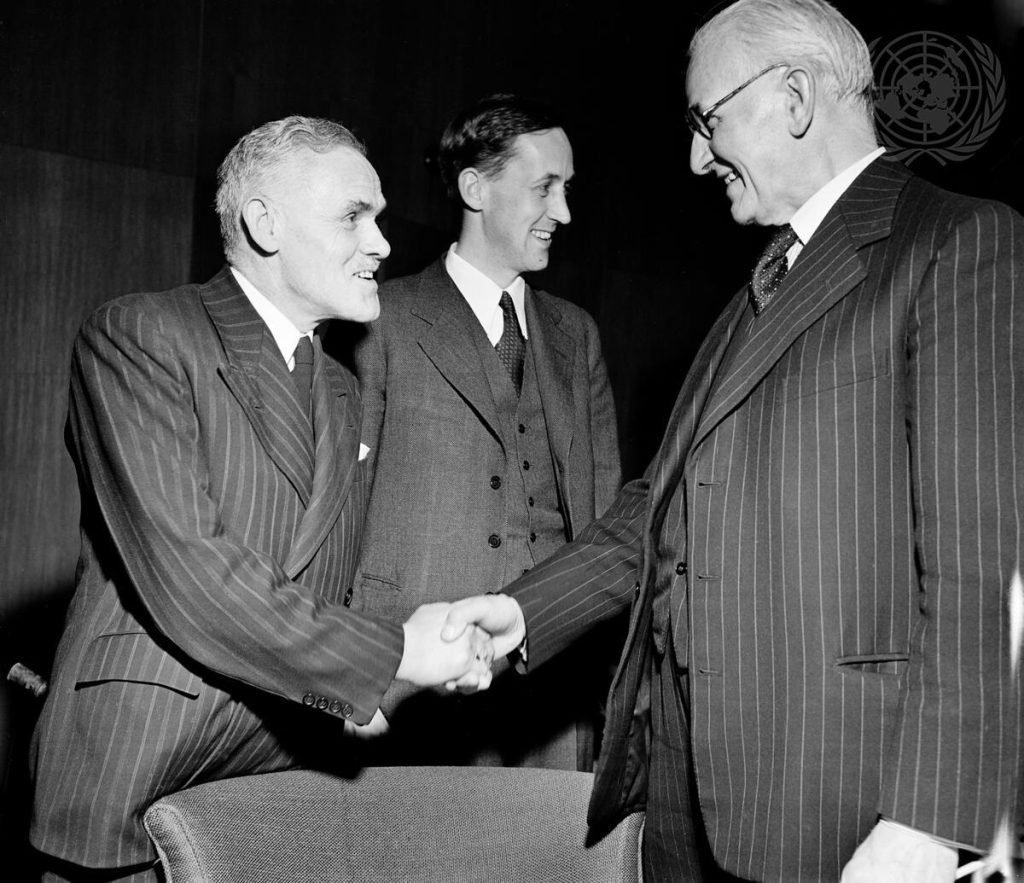
Fearghas O’Beara is head of unit at the European Parliamentary Research Service and a doctoral student at the Pontifical Gregorian University, Rome, Italy. This post is excerpted from an article in the December 2023 special issue of The Review of Faith & International Affairs commemorating the 75th anniversary of the Universal Declaration of Human Rights.
The Former-Felons’ Feast
On the evening of 9 January 1924, a group of 19 ex-convicts—both men and women—gathered within the confines of the British Houses of Parliament in London. This motley crew were not plotting a re-enactment of Guy Fawkes’s attempt to blow up Parliament three centuries earlier, but they were all purveyors of highly explosive ideas—ideas that the British Establishment of the early twentieth century decided merited being put behind bars.
In fact, the 19 had served their time in His Majesty’s Prisons and were now all newly elected Members of Parliament who had just sworn and oath of allegiance to King George V. Among the guests at this “Fetters and Roses” dinner was The Honourable Charles Dukes, Labour Party MP for Warrington. The group included “Suffragettes” who campaigned for women’s right to vote; one Presbyterian and two Methodist preachers, the editor of the Catholic Herald, and several Quakers, all of whom had disseminated pacifist messages during World War I; as well as strikers and militant trade unionists who protested for workers’ rights.

Dukes ticked two of those boxes, being both a union organizer and a conscientious objector. It was for the latter activity that he had been court martialed in 1916 and sentenced to two years’ hard labor. Although not religious, he invoked the “conscience” clause of Britain’s World War I conscription law, arguing that his objections were moral ones and equivalent to deeply held religious beliefs.
Dukes, the Union Man and Labour Politician
Within weeks of the “Fetters and Roses” dinner, the Conservative-led Government had fallen and Ramsay MacDonald became the first-ever Labour Prime Minister of the UK, appointing three of those dinner guests as Ministers. Dukes’s first mandate as an MP lasted just one year before the Labour Government in turn fell. He returned to Parliament again when Labour were back in power from 1929 to 1931. During his two short mandates he made around 60 interventions, almost exclusively on socio-economic issues. He was a strong advocate of the dignity of workers and pushed for decent working conditions, as well as protection for the incapacitated or unemployed.
The Labour Party emerged organically from the older trade union movement in the early part of the twentieth century; most of Dukes’s career was spent in organized labor. He left school aged 11 to work as a delivery boy and steadily climbed his way up his union hierarchy, and from there to the national movement, the Trades Union Congress (TUC), finally being elected TUC President in 1946.
Dukes, Сo-drafter of the Universal Declaration
The UK was one of the founding states of the United Nations in 1945. As a World War II victor and an undefeated nation with a global empire, it was expected to play a significant role in the new UN Human Rights Commission’s first task—drafting an international bill of rights. It came as a surprise then—not least to the UK Foreign Office—when the British Government nominated as its representative to the talks, not its preeminent human rights expert Hersch Lauterpacht but TUC President Charles Dukes, a man with little formal education or international experience.
Dukes’s appointment was made possible because in 1945—to the amazement of the world—the British electorate had unceremoniously ejected wartime Prime Minister Winston Churchill from office and ushered in the UK’s first Labour-majority Government. Labour, under Prime Minister Clement Atlee, had a 146-seat lead in the House of Commons—a resounding mandate to bring about the radical socio-economic changes outlined in its manifesto. The coal, gas, and electricity industries were nationalized with trade union representation on their boards, as was the Bank of England, with Dukes being appointed a director in 1947.

The new Labour Foreign Secretary was Ernest Bevin, a man whose own life had many parallels with that of Dukes. Born in the same year (1881), Bevin also left school aged 11 and had a career that wove between trade unionism and the Labour Party. Like Dukes, he had ascended to the highest office in British organized labor, TUC President (1937). In sending Dukes to represent the UK in drafting what would become the Universal Declaration of Human Rights, Bevin chose a man cut from the same cloth. Their working-class backgrounds and decades of trade union and Labour activism meant that Bevin trusted Dukes to advocate the social vision of the new British Labour Government and to ensure that social and economic rights found their place in the international bill of rights, alongside civil and political ones.
Forging a Shared Vision of Human Dignity
Dukes, the union man, took his seat alongside jurists, academics, and diplomats. The Secretary of the Commission, John P. Humphrey, did not view him as a major player and considered the intellectual powerhouses of the Universal Declaration to be Commission Chair Eleanor Roosevelt from the United States, Lebanese representative Charles Malik, Republic of China representative P. C. Chang, and René Cassin of France. Some later commentators were similarly dismissive of a “trade unionist . . . not very familiar with human rights issues,” perhaps forgetting that social and economic rights are a core part of the human rights corpus, as indeed they were integral to the “four freedoms” outlined by U.S. President Franklin D. Roosevelt in his State of the Union speech of 1941.

Unlike many other national representatives in the Commission—Roosevelt, Malik, Santa Cruz, Romulo—whose arguments were rooted in a Christian anthropological vision, Dukes drew his inspiration from a deist rather than a religious worldview. As a boy of 17 he spent sixpence of his wages on a copy of Thomas Paine’s 1791 classic The Rights of Man, which he read and re-read throughout his life. Dukes’s interventions in the Commission reflect Paine’s philosophy of natural rights and point to a belief in self-reliance, viewing the role of government as ensuring those rights.
The Race to Beat the Outbreak of the Cold War
The Universal Declaration was drafted and adopted during the window of opportunity between the end of World War II in 1945 and the outbreak of the Korean War in 1950. It was a time when the Western powers cooperated with the USSR-led communist bloc to plan a peaceful international order, with the newly founded United Nations organization being central to the architecture. Bevin was UK Foreign Secretary throughout the period and was determined to win the battle against international communism for the heart and soul of the working classes. Like Dukes, in the inter-war period he had worked to root out communist influence from British trade unions and the Labour Party.
Both Bevin and Dukes were acutely aware of the Soviet game plan to weaken the West from within through infiltration of unions and left-wing parties, agitation of ethnic minorities and wartime displaced populations, and support for independence movements in European colonies. These early stirrings of the Cold War spilled over into Commission meetings in New York and Geneva. As he had done throughout his union and political career, Dukes worked to ensure the rights of workers and the poor were not neglected in the drafting of the Declaration. Added to this, he supported the legitimate aspirations of the peoples in Britain’s colonies and sought to ensure their human dignity was protected by the bill of rights. He clashed on a number of occasions with representatives of communist states on the Commission such as Ukrainian SSR and Yugoslavia, vehemently rejecting their arguments that the Draft International Covenant on Human Rights (prepared by the Working Group he chaired) disregarded the rights of the poor, workers, and unemployed. All four communist countries voted against the Draft submitted by Dukes; ultimately, they would abstain in the final vote on the Universal Declaration.
Dukes’s Legacy in the Universal Declaration
Between the first session of the Human Rights Commission in New York, in January and February 1947, and the second in Geneva, in December that year, Dukes was ennobled by King George on 1 April 1947, with the title Baron Dukeston of Warrington in the County Palatine of Lancaster. He played an active role in all 42 meetings of those two sessions, but sadly, for a man who spent most of his life working for human rights in the socio-economic sphere, he did not live to see the Universal Declaration adopted by the UN General Assembly on 10 December the following year.
Charles Dukes (Lord Dukeston) passed away on 14 May 1948, weeks before the start of the third and final session of the Commission. Unlike other members of the Commission, he did not live to write his memoirs nor to pursue a career in academia, the judiciary, or diplomacy, building on the legacy of the Declaration. Nevertheless, Dukes played an important role in the drafting of the Universal Declaration due to his unique background and experience and his intimate understanding of the need—both moral and geopolitical—to ensure social and economic rights were duly recognized and protected at an international level.
